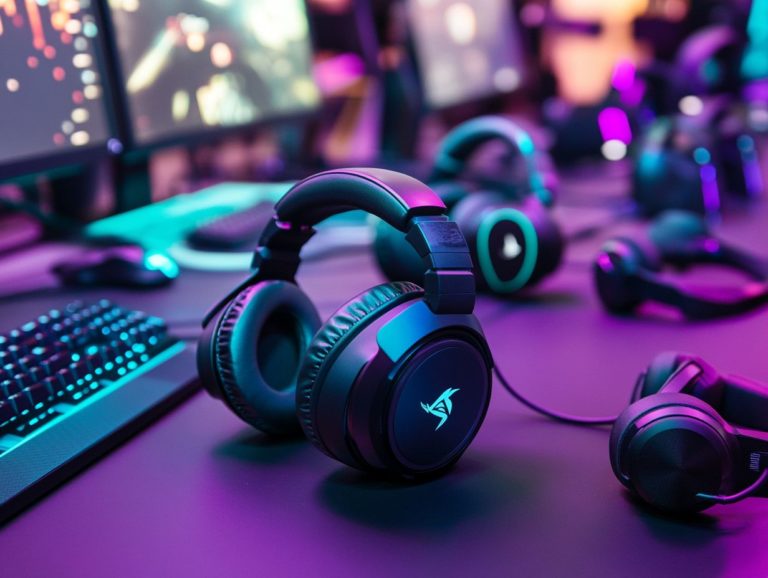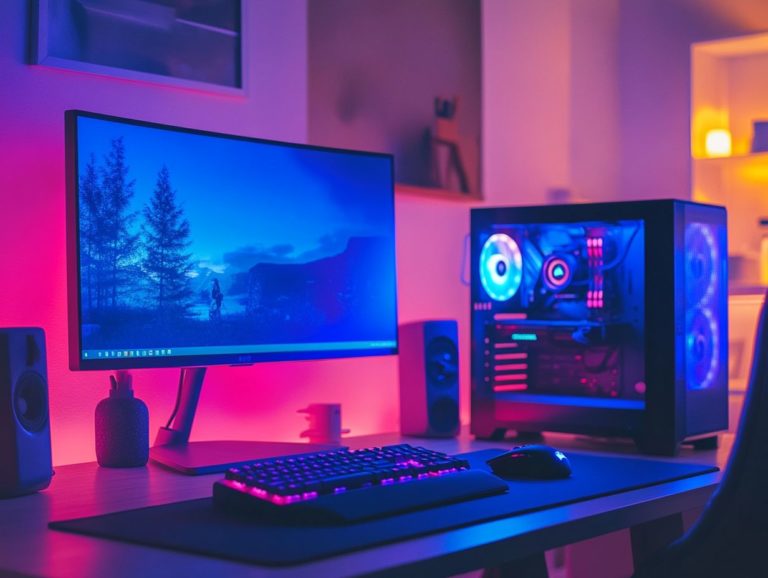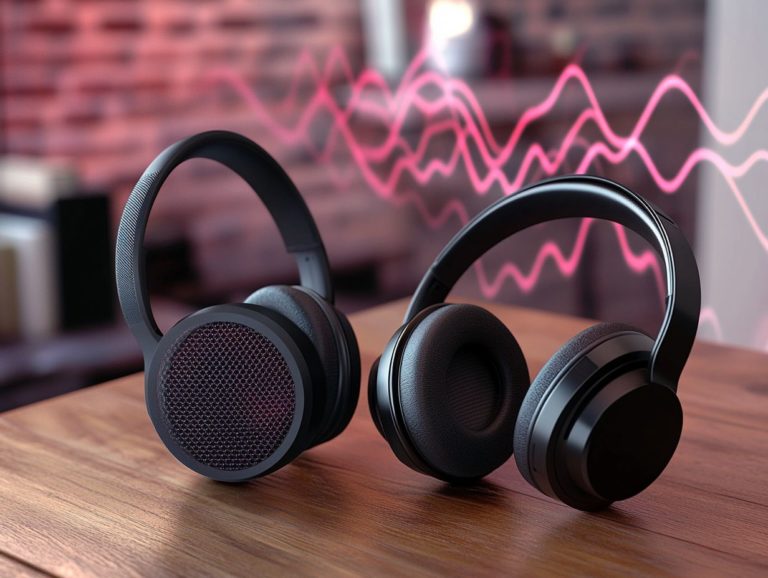how to troubleshoot common gaming hardware problems?
In the fast-paced realm of gaming, facing hardware issues can be a frustrating roadblock that disrupts your immersive experience and hampers performance.
Whether you’re grappling with overheating, crashing, or connectivity problems, knowing how to diagnose and resolve these issues is crucial for any serious gamer. This guide will walk you through essential troubleshooting techniques, helping you distinguish between software and hardware challenges while offering practical solutions for common problems.
You will also discover preventative measures designed to keep your gaming rig running at peak performance, ensuring you remain in the game without interruptions.
Contents
- Key Takeaways:
- Understanding Common Issues
- Troubleshooting Techniques for Gaming Hardware
- Software vs Hardware Issues
- Common Gaming Hardware Problems and How to Fix Them
- Preventative Measures for Avoiding Gaming Hardware Problems
- Frequently Asked Questions
- What are some common gaming hardware problems that I may encounter?
- How can I troubleshoot overheating issues with my gaming hardware?
- What should I do if my game keeps freezing or crashing?
- Why is my gaming hardware running slower than usual?
- How can I troubleshoot audio issues with my gaming hardware?
- What should I do if my gaming hardware is not connecting to my computer?
Key Takeaways:
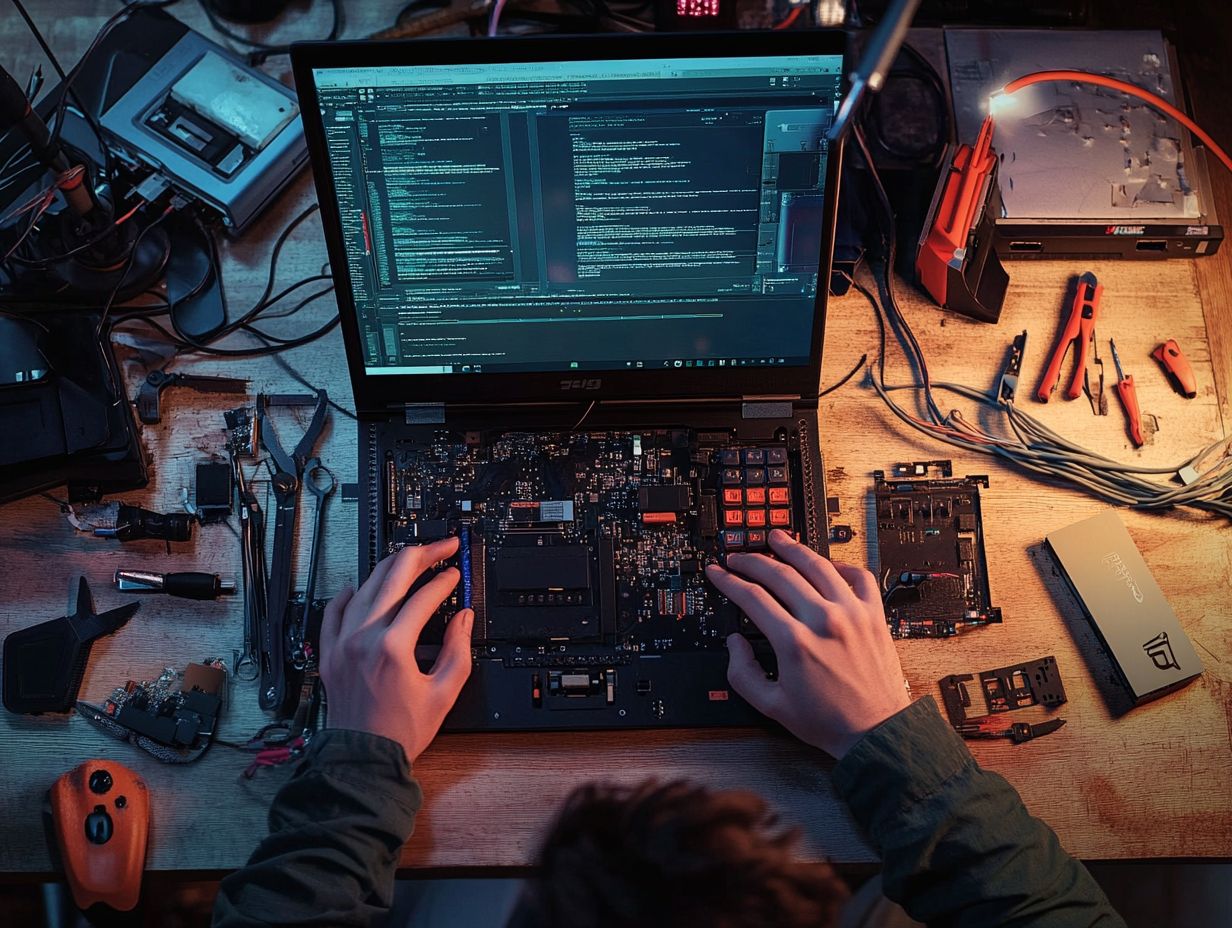
- Learn common gaming hardware issues and how to fix them.
- Differentiating between software and hardware problems for accurate diagnosis.
- Implement regular maintenance to keep your gaming rig in top shape.
Understanding Common Issues
It’s vital to know common problems with gaming PCs. Crashes and lag can ruin your fun. Identifying the cause is the first step to fixing it.
Many players may not realize that issues like insufficient memory, outdated drivers, or even overheating can significantly impact gameplay. If you notice stuttering or frame drops, it could be a sign of hardware bottlenecks, such as a failing graphics card or an inadequate power supply.
On the software side, misconfigured settings or background applications hogging resources can lead to frustrating lag. Understanding these elements can greatly enhance your troubleshooting effectiveness, ensuring you not only recognize symptoms but also apply the right diagnostics and solutions.
Troubleshooting Techniques for Gaming Hardware
Troubleshooting is key for gamers. It helps maintain your system and boosts performance. Regularly update drivers and check BIOS settings to avoid issues.
Whether you’re optimizing your gaming PC or tackling hardware issues, effective troubleshooting can often save you from significant interruptions in your gaming experience. By routinely updating drivers and utilizing diagnostic tools, you can pinpoint problems and restore functionality.
Master troubleshooting your gaming PC to transform your gaming sessions into seamless experiences, allowing you to fully immerse yourself in the gameplay without technical hiccups.
Step-by-Step Guide for Diagnosing and Fixing Problems
Follow this step-by-step guide to tackle issues with your gaming PC. Start by noting symptoms, like black screens or error messages.
These signs often point to critical hardware issues or software conflicts that demand immediate attention. By adhering to a systematic process, you can accurately determine the root causes of computer crashes and take the necessary steps to restore functionality.
Begin by observing when the issue arises whether during startup, in-game, or while running certain applications. Pay attention to any unusual sounds or error messages that accompany these symptoms, as they often hold vital clues.
Once you ve gathered this initial information, perform basic hardware checks. Ensure that all cables are securely connected and that your components are free of dust.
If the issue persists, dive into the software realm by updating drivers or scanning for malware. This will help you develop a comprehensive understanding of your system’s health and bring you closer to a solution. Don’t wait! Start troubleshooting today to keep your gaming experience smooth and enjoyable.
Software vs Hardware Issues
Differentiating between software and hardware issues is essential for gamers who want to troubleshoot their gaming PCs effectively and enhance their gaming experience.
Recognizing whether a problem comes from hardware like a failing power supply or overheating components or software such as corrupted drivers or an outdated operating system can streamline your troubleshooting process.
By identifying these distinctions, you empower yourself to take targeted actions that address the root causes of your issues, ensuring a more enjoyable and uninterrupted gaming experience.
Differentiating Between the Two
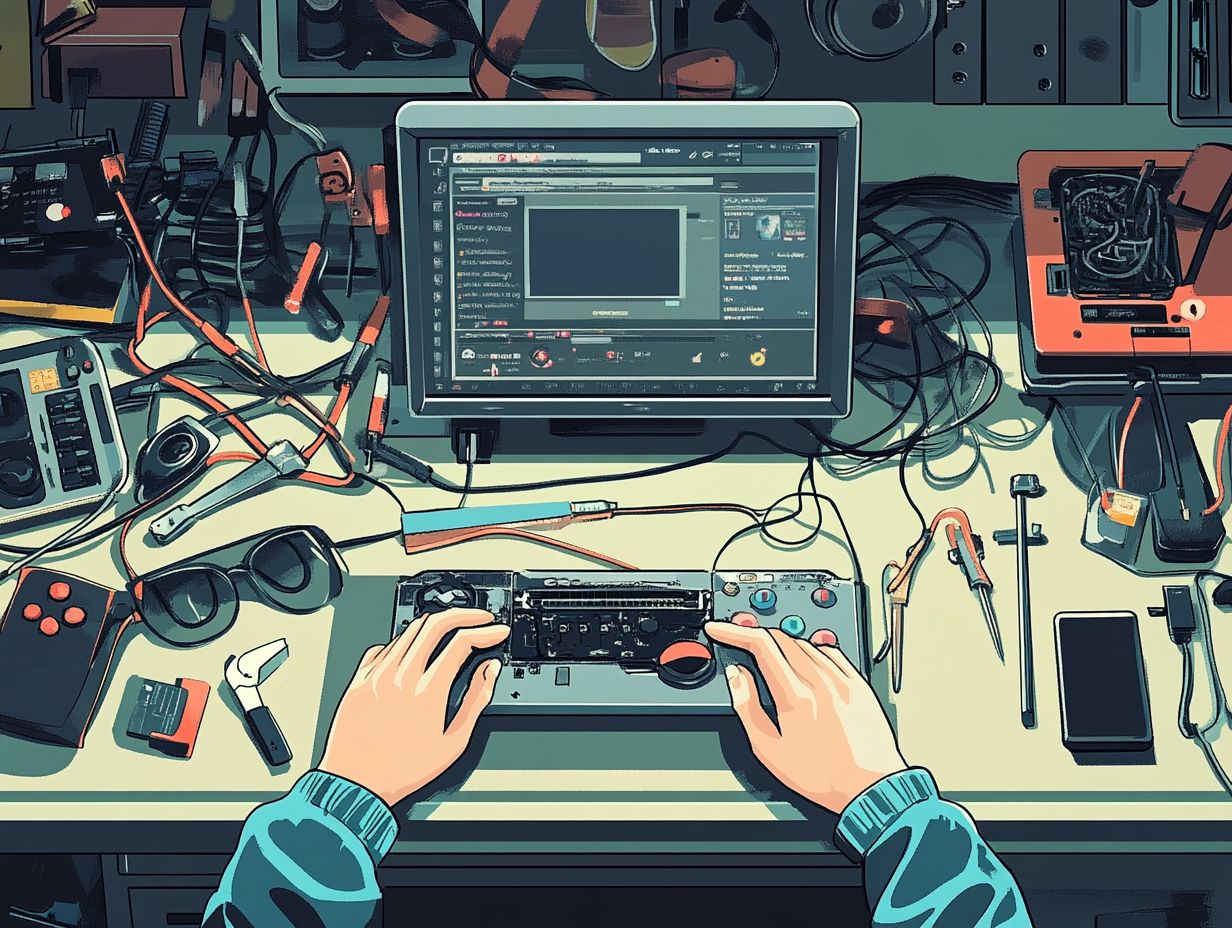
Understanding the differences between software and hardware issues is key for effective troubleshooting.
When you face sluggish gameplay or frequent crashes, a thorough diagnosis can help identify the root cause. Software problems might show up as freezing screens, error messages when launching games, or slow downloads. Often, these can be fixed through updates, clean installations, or adjusting your graphics settings.
On the other hand, hardware issues may present as unusual noises, overheating, or erratic behavior like boot failures. In such cases, checking connections, monitoring temperatures, or running diagnostic tests can be invaluable.
By checking these symptoms, you can focus on the right fixes, ensuring a smoother and more enjoyable gaming experience.
Common Gaming Hardware Problems and How to Fix Them
Common gaming hardware problems can disrupt your gameplay, making it crucial to know how to address them for a seamless experience.
Issues like overheating, crashing, freezing, slow performance, and connectivity problems can arise from various factors insufficient hardware specifications, improper configurations, or even environmental conditions.
Identifying these issues early and employing effective troubleshooting techniques will keep your system running smoothly, allowing you to fully immerse yourself in your gaming adventures.
Overheating
Overheating is a common issue for gaming PCs that can lead to serious hardware damage if not addressed quickly. If your gaming rig runs hot, you may experience performance drops, sudden crashes, or even irreversible damage to key components.
Make sure your cooling system is always in top shape to keep your gaming rig cool and powerful! Regular maintenance and cleaning are essential for keeping your setup operating at its best.
It’s important to understand what causes overheating. Factors like dust buildup, poor ventilation, or an ineffective cooling system can contribute to the problem. Watch for signs like unusual fan noises, rising temperature readings, and erratic game performance these could be warning signals that your system is struggling.
Act fast to tackle these concerns! Create a routine for cleaning components and replacing thermal paste when needed. Investing in high-quality cooling solutions can stop your PC from slowing down due to overheating, ensuring smoother gameplay and extending your hardware’s lifespan.
Crashing or Freezing
Crashing or freezing can be a real headache for gamers, interrupting gameplay and causing data loss. Understanding the common causes of crashes from insufficient resources to software conflicts can help you troubleshoot these issues more effectively.
Regularly updating your drivers and conducting system checks can alleviate these problems, ensuring a smoother gaming experience.
Overheating from inadequate ventilation or dust buildup can also severely affect performance. Additionally, components like failing hard drives or insufficient RAM might contribute to instability.
To address these concerns, keep your cooling system organized and make sure your hardware meets the game’s requirements. Use performance monitoring tools for insights into your system s health, allowing you to tackle potential issues before they escalate.
By implementing these preventive measures, you can improve your setup and significantly reduce the chances of frustrating interruptions.
Slow Performance
Slow performance can ruin your gaming experience. Lag and interruptions can be incredibly frustrating.
Several factors contribute to sluggishness, including insufficient memory, outdated drivers, and poor software configurations.
By optimizing your gaming PC, you can find root causes and implement solutions to enhance speed and responsiveness. Regular maintenance, updates, and hardware upgrades are essential for keeping your gaming setup ready for modern titles.
It’s important to understand these issues. For example, having enough RAM for the latest games is crucial, as many contemporary titles require more memory to run smoothly. Similarly, outdated graphics drivers can severely hinder performance, making it vital to keep them updated.
Software adjustments, such as fine-tuning in-game settings and disabling unnecessary background applications, can lead to big improvements in frame rates.
Regular hardware assessments will help identify components that could cause bottlenecks. Consider potential upgrades, like a new GPU or SSD, to greatly improve your gaming speed and efficiency.
Connectivity Issues
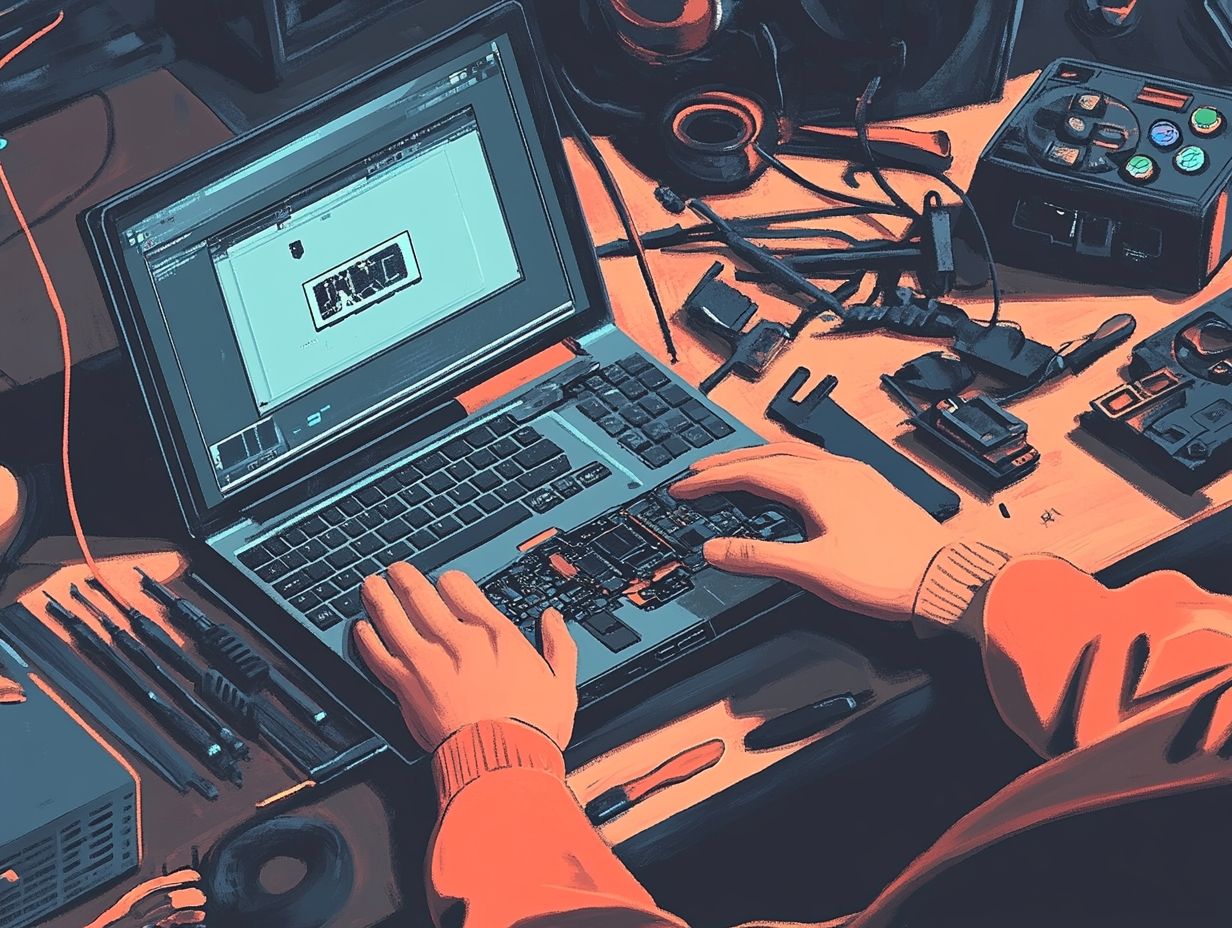
Connectivity issues can disrupt your gaming, especially in online scenarios. Whether your PC struggles to connect via LAN, Ethernet, or USB, identifying the problem is essential. Faulty hardware, incorrect settings, or malware might be involved.
By troubleshooting these issues, you can restore seamless online play and keep your gaming environment enjoyable. Gamers often face interruptions due to router malfunctions, unstable Wi-Fi signals, or firewall settings blocking online access.
Check all hardware connections. Make sure your cables are secure and undamaged. Adjusting network settings can also help. Consider tweaking your Quality of Service settings or reconnecting to your network.
If those options don t work, run a malware scan to find hidden threats causing lag or connection drops. By taking these steps, you resolve immediate issues and create a more reliable gaming setup.
Preventative Measures for Avoiding Gaming Hardware Problems
Implementing preventative measures will save you from future headaches and guarantee a seamless gaming experience.
Regular maintenance routines like cleaning your hardware and updating drivers and software are crucial for preventing issues such as overheating, crashes, and performance drops.
By embracing proactive strategies, you enhance your gaming PC’s longevity and performance, allowing you to immerse yourself in your favorite games without interruptions.
Maintaining and Cleaning Your Hardware
Maintaining and cleaning your hardware is crucial for a long-lasting and optimal gaming experience. Dust accumulation and overheating can significantly undermine performance.
Regular maintenance keeps vital components like graphics cards and hard drives functioning smoothly, enhancing your overall gameplay experience.
Use compressed air to clean fan blades and vents effectively. Soft microfiber cloths can help keep your screens and surfaces pristine, free from smudges and grime.
By prioritizing this upkeep, you can enjoy improved performance, reduced noise levels, and satisfaction from knowing your system is in peak condition.
Updating Drivers and Software
Updating your drivers and software is essential for a top gaming PC. It prevents issues that could disrupt your gameplay.
Regular updates ensure compatibility with the latest games, boost performance, and fix known bugs or vulnerabilities.
By keeping your drivers and software current, you significantly reduce the risk of frustrating gaming problems. This allows for a seamless experience as you immerse yourself in the latest titles.
To check for updates, head to the Device Manager on Windows a tool that helps manage your hardware or use software provided by manufacturers like NVIDIA or AMD.
Regular maintenance enhances overall performance and unlocks new features and optimizations. These updates elevate your gaming visuals and speed.
With each update, you can enjoy smoother frame rates and reduced load times, creating a more immersive gaming environment.
Addressing software vulnerabilities secures your system against potential threats. This contributes to a safer and more enjoyable gaming experience.
Frequently Asked Questions
What are some common gaming hardware problems that I may encounter?
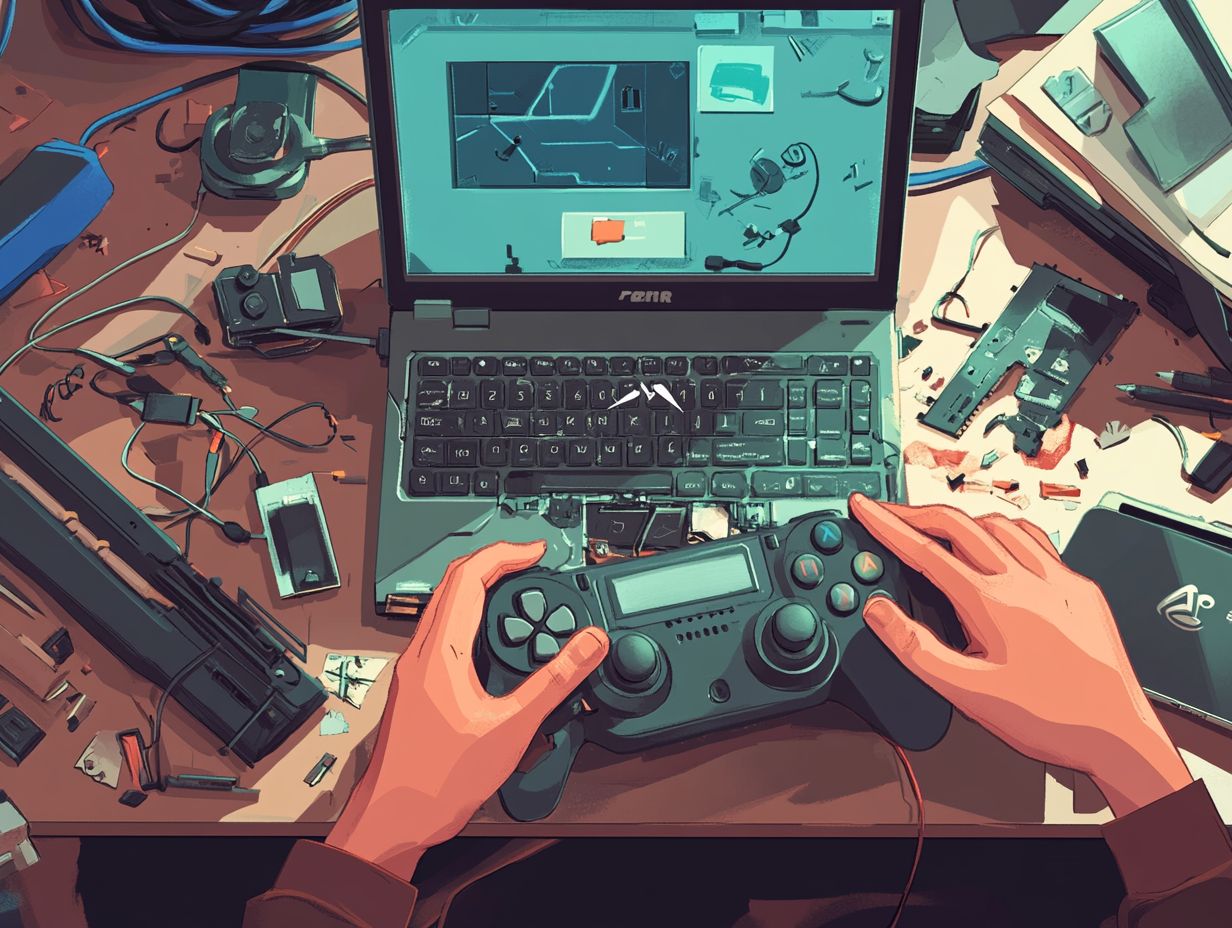
Some common gaming hardware problems include overheating, freezing, crashing, and slow performance.
How can I troubleshoot overheating issues with my gaming hardware?
To troubleshoot overheating, ensure your computer is in a well-ventilated area.
Clean any dust or debris from the fans and vents, and consider using a cooling pad or adjusting your graphics settings.
What should I do if my game keeps freezing or crashing?
If your game is freezing or crashing, try updating your graphics drivers.
Close any other programs running in the background and check for any available game updates.
Why is my gaming hardware running slower than usual?
Potential reasons for slow performance include outdated drivers, low storage space, or a lack of RAM.
Try updating your drivers, freeing up space on your hard drive, or adding more RAM.
How can I troubleshoot audio issues with my gaming hardware?
If you are experiencing audio issues while gaming, ensure your speakers or headphones are properly connected.
Check your in-game audio settings and update your sound drivers.
What should I do if my gaming hardware is not connecting to my computer?
If your gaming hardware is not connecting properly, try unplugging and replugging the device.
Check for any available driver updates and use different USB ports to see if that makes a difference.

